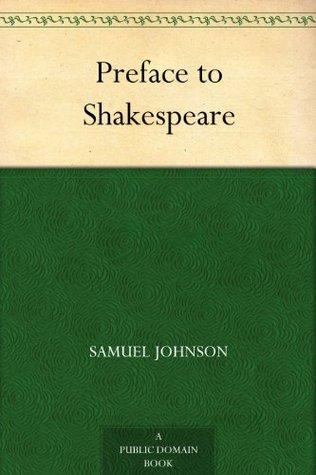More on this book
Community
Kindle Notes & Highlights
The great contention of criticism is to find the faults of the moderns, and the beauties of the ancients. While an authour is yet living we estimate his powers by his worst performance, and when he is dead we rate them by his best.
Shakespeare is above all writers, at least above all modern writers, the poet of nature; the poet that holds up to his readers a faithful mirrour of manners and of life.
It was observed of the ancient schools of declamation, that the more diligently they were frequented, the more was the student disqualified for the world, because he found nothing there which he should ever meet in any other place.
Shakespeare's plays are not in the rigorous and critical sense either tragedies or comedies, but compositions of a distinct kind; exhibiting the real state of sublunary nature, which partakes of good and evil, joy and sorrow, mingled with endless variety of proportion and innumerable modes of combination;
The end of writing is to instruct; the end of poetry is to instruct by pleasing.
concatenation.
Imitations produce pain or pleasure, not because they are mistaken for realities, but because they bring realities to mind.
The English nation, in the time of Shakespeare, was yet struggling to emerge from barbarity. The philology of Italy had been transplanted hither in the reign of Henry the Eighth; and the learned languages had been successfully cultivated by Lilly and More; by Pole, Cheke, and Gardiner; and afterwards by Smith, Clerk, Haddon, and Ascham. Greek was now taught to boys in the principal schools; and those who united elegance with learning, read, with great diligence, the Italian and Spanish poets. But literature was yet confined to professed scholars, or to men and women of high rank. The publick
...more
perspicacity,
temerity
diligence.
reprehension;
desultory
The reader, I believe, is seldom pleased to find his opinion anticipated; it is natural to delight more in what we find or make, than in what we receive. Judgement, like other faculties, is improved by practice, and its advancement is hindered by submission to dictatorial decisions, as the memory grows torpid by the use of a table book.
animadversion.
But my first labour is, always to turn the old text on every side, and try if there be any interstice, through which light can find its way;
Particular passages are cleared by notes, but the general effect of the work is weakened. The mind is refrigerated by interruption; the thoughts are diverted from the principal subject; the reader is weary, he suspects not why; and at last throws away the book, which he has too diligently studied.
But Falstaff unimitated, unimitable Falstaff, how shall I describe thee? Thou compound of sense and vice; of sense which may be admired but not esteemed, of vice which may be despised, but hardly detested.
timorous
dotage.
dereliction
Hamlet is, through the whole play, rather an instrument than an agent. After he has, by the stratagem of the play, convicted the King, he makes no attempt to punish him, and his death is at last effected by an incident which Hamlet has no part in producing.


